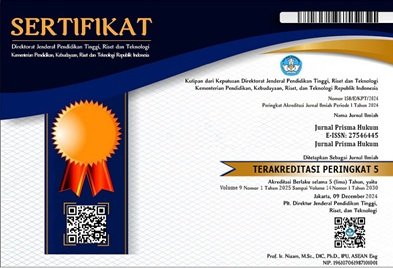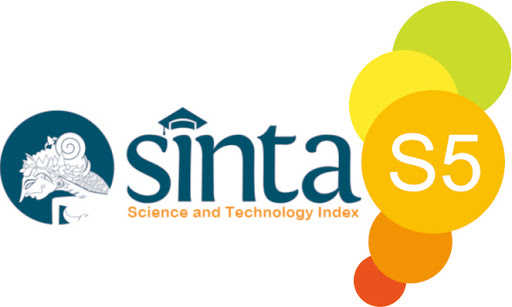PERTANGGUNGJAWABAN PIDANA TERHADAP PELAKU JURU TAGIH LESING (DEBT COLLECTOR) ATAS PENCURIAN DENGAN PEMBERATAN
Kata Kunci:
Pertanggung jawaban Pidana, Pelaku Juru Tagih Lesing (Debt Collector) Dan Pencurian Dengan PemberatanAbstrak
Tujuan penelitian ini adalah Untuk menganalisis pertanggungjawaban pidana terhadap pelaku juru tagih lesing (debt collector) atas pencurian dengan pemberatan. Untuk menganalisis vonis di jatuhkan hakim dalam perkara pelaku juru tagih lesing (debt collector) atas pencurian dengan pemberatan sudahkah mencerminkan keadilan dan menimbulkan efek jera. Dalam penelitian ini, tipe penelitian yang digunakan adalah yuridis normatif. Pendekatan yang digunakan adalah pendekatan yang berorientasi pada kebijakan (Policy-Oriented Approach). Pengumpulan bahan hukum primer, bahan hukum sekunder, dan bahan hukum tersier dengan menggunakan sistem kartu (Card System) dan didukung System Computezation melalui internet. Pertanggungjawaban pidana terhadap pelaku juru tagih lesing (Debt Collector) atas pencurian dengan pemberatan sebagaimana yang telah didakwakan penuntut umum dalam dakwaan kedua Pasal 363 Ayat 1 ke 4 KUHP dan oleh karena tidak ditemukan alasan pemaaf yang meniadakan sifat melawan hukum dan alasan pembenar yang meniadakan kesalahan dalam diri terdakwa, maka terdakwa harus dinyatakan bersalah dan kepada terdakwa harus dijatuhi pidana yang setimpal dengan perbuatannya yang ancamannya menurut Pasal 363 KUHP diancam dengan pidana penjara maksimal 9 (sembilan) tahun. Tetapi dalam perkara ini terdakwa dijatuhi pidana penjara selama selama 5 (lima) bulan, 15 (lima belas) hari penjara berdasarkan putusan Nomor: 340/Pid.B/2022/Pn.Jmb. Vonis yang dijatuhkan masih terlalu ringan mengingat terdakwa sangat meresahkan masyarakat dan merugikan korban sebagai masyarakat dengan mengambil kendaraan milik korban tanpa sepengetahuan. Maka hakim yang hanya menjatuhkan 5 (lima) bulan, 15 hari penjara dinilai masih belum mencerminkan rasa keadilan dan menimbulkan efek jera bagi pelaku Debt Collector. Saran yang dikemukakan hendaknya untuk mengantisipasi penggunaan juru tagih (Debt Collector) Hendaknya pihak HRD Leasing juga mungkinkan untuk dikenakan sanksi pasal 55 Ayat (1) Kitab Undang-Undang Hukum Pidana tujuannya agar memberikan efek jera bagi pihak HRD Leasing yang merekrut dan mempekerjakan Debt Collector tersebut.
The aim of this research is to analyze the criminal liability of debt collectors for theft with weighting. To analyze the verdict handed down by the judge in the case of a debt collector for theft with weighting, whether it reflects justice and has a deterrent effect. In this research, the type of research used is normative juridical. The approach used is a policy-oriented approach. Collection of primary legal materials, secondary legal materials and tertiary legal materials using a card system and supported by a Computezation System via the internet. Criminal liability for the perpetrator of the debt collector for aggravated theft as charged by the public prosecutor in the second indictment of Article 363 Paragraph 1 to 4 of the Criminal Code and because no excuse was found that negated the unlawful nature and justification that eliminated the error in the defendant himself, then the defendant must be declared guilty and the defendant must be sentenced to a crime commensurate with his actions, which according to Article 363 of the Criminal Code is punishable by a maximum prison sentence of 9 (nine) years. However, in this case the defendant was sentenced to prison for 5 (five) months, 15 (fifteen) days in prison based on decision Number: 340/Pid.B/2022/Pn.Jmb. The sentence handed down is still too light considering that the defendant really disturbed the community and harmed the victim as a community by taking the victim's vehicle without their knowledge. So the judge who only sentenced him to 5 (five) months, 15 days in prison was deemed to have not reflected a sense of justice and had a deterrent effect on the perpetrators of debt collectors. The suggestions put forward should be to anticipate the use of debt collectors. It should also be possible for the HRD Leasing party to be subject to sanctions under Article 55 Paragraph (1) of the Criminal Code with the aim of providing a deterrent effect for the HRD Leasing party who recruits and employs the Debt Collector.





